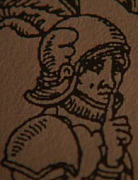|
Elissimpark posted:Which made me think - when did the general attitude to mercaneries change? Everyone loves them in Renaissance Italy and into the early modern era. Now - not so much. People who were on the pointy end of mercenaries learned how to write.
|
|
|
|

|
| # ? Jun 7, 2024 14:09 |
|
They didn't like mercenaries, they used them
|
|
|
|
Well when did using them start getting generally frowned upon?
|
|
|
|
You had Machiavelli frowning on Mercenaries hundreds of years ago so there might have always been some sort of undercurrent. I remember that there might have been a thing regarding the Hessians that were fighting the Americans? I kinda feel their reputation nose dived in particular as a result of decades of the use of PMCs during Operation Bomb Useless Dirt; I don't really remember anything in particular pre 2001.
|
|
|
|
Mercenaries have been a necessary evil for a lot of nations, but they sure as poo poo didn't invite them to stay once their usefulness was over. They have been glorified at certain points in history, most recently in right wing US cold warrior "fighting the communists in 3rd world countries" But dogs of war never get a home when the war is over.
|
|
|
|
Elissimpark posted:Well when did using them start getting generally frowned upon? The average civilian doesn't like the idea of people being hired to go murder people or otherwise sow destruction. Especially if they've ever had to suffer this. But the idea that anybody in charge should care what civilians think about war is young, like only 200 years old
|
|
|
|
I'm by no means an actual expert, but my sense is that mercenaries fall off after the end of the 30 Years War for a bunch of related reasons. On the political side, Westphalia begins to sort out issues of sovereignty and multiple allegiances which characterized the Middle Ages. The new ideal is that every patch of land and every person is accountable to a single ruler, who is responsible for marshalling them in warfare. The scope for private violence contracts. Similarly, the conduct of mercenary armies in the 30 Years War was so atrocious that they lose any social standing that they had. And finally, the increased expense of gunpowder siege trains meant that only an actual power could go to war. Some random count or baron simply didn't have the financial resources to equip a meaningful army. Of course, all of these trends only applied on land in Europe. Roughly at the same time as the Napoleonic Wars, the British East India company was completing its conquest with an army that outnumbered and likely outgunned the actual British Army, pretty much all of them Indian mercenaries fighting for a British joint stock company. And Letters of Marque were issued in large numbers through the War of 1812.
|
|
|
|
The usual story is that in the early middle ages states called up feudal levies with a core of professional knights and a bunch of militia-grade infantrymen to do your fighting for you. But those were unwieldy to call up and keep in the field and were still made up largely of non-professionals. So some soldiers formed units and went into full-time professional work, hiring themselves out as mercenary units - pay them in cash, they'll do your fighting for you, and they'll probably win (because they are professionals fighting mostly amateurs). So in the later middle ages rulers spent a lot of money hiring mercenaries because 1) if you didn't, then you would probably lose to the guy who did hire them, and 2) lots of entities (like Italian city-states) didn't have the ability to call out big levies (but did have plenty of ready cash). Mercenaries were used because they were better than the alternatives, not because everyone loved mercenaries. They had a number of drawbacks, all of which were well known. Once the Military Revolution got underway and state consolidation got rolling, states became large enough and rich enough to maintain their own standing armies (and not have to rely on levies or mercenaries), and mercenaries become eclipsed as the premiere military units of their day.
|
|
|
|
FMguru posted:The usual story is that in the early middle ages states called up feudal levies with a core of professional knights and a bunch of militia-grade infantrymen to do your fighting for you. But those were unwieldy to call up and keep in the field and were still made up largely of non-professionals. So some soldiers formed units and went into full-time professional work, hiring themselves out as mercenary units - pay them in cash, they'll do your fighting for you, and they'll probably win (because they are professionals fighting mostly amateurs). So in the later middle ages rulers spent a lot of money hiring mercenaries because 1) if you didn't, then you would probably lose to the guy who did hire them, and 2) lots of entities (like Italian city-states) didn't have the ability to call out big levies (but did have plenty of ready cash). Mercenaries were used because they were better than the alternatives, not because everyone loved mercenaries. They had a number of drawbacks, all of which were well known. That's not really accurate, as far as we know feudal levies were mostly professional soldiers drawn from the military classes (though that's a big class and going somewhat down the ladder you get to people who work as farmers part-time alongside being soldiers), poorly trained peasant levies are essentially a fiction, and when you find peasant levies such as the Anglo-Saxon fyrd they are neither poorly trained nor arbitrarily forced to fight (they are free peasants who own enough land to be able to afford military equipment and thus are required to perform military service on, which involves getting together with community members for exercise and training and all that). The big disadvantage with feudal levies is that they serve on a very limited bases, often not contracted to serve for longer than a couple of months (I think 40 days is the typically cited exampel) and often also with limitations on where they are required to serve, the actual forces aren't necessarily low quality. Also they are drawn from your own vassals, which is a political disadvantage itself that will often worry alot of pre-modern rulers because they (or rather their leaders) then necessarily are embedded in your political systems and have interests and aims of their own which may run counter to yours. Mercenaries meanwhile you only have to pay and they will serve as long as you pay them, this makes things alot simpler when you have the means to pay them and contrary to popular belief mercenaries weren't always hired and then gotten rid off once the war was over but were retained for long periods of time, even in peace, and essentially formed a standing royal army (which could be augmented with feudal levies or additional mercenaries). What's more, mercenaries would often be foreigners, and foreigners, being outsiders, were typically seen as inherently more loyal and reliable because they were basically entirely dependent on their employer/patron for their position, also being outsiders meant they did not have domestic political loyalties and interests so to speak. An interesting example of this is that the highest-ranking military official in Florence by custom (and I think eventually by law) had to be a foreigner (or rather, not a citizen of Florence).
|
|
|
|
Raenir Salazar posted:I kinda feel their reputation nose dived in particular as a result of decades of the use of PMCs during Operation Bomb Useless Dirt; I don't really remember anything in particular pre 2001. Their use in Africa during the cold war. Probably not super well known in the west today though
|
|
|
|
Machiavelli's the Prince and Art of War IIRC had a lot of criticism of the use of mercenairies by the Italian city states. But then he was an advocate of citizens militia as a replacement.
|
|
|
|
Mercenaries are also noted for being able to be used against your own people, when an army drawn from those same people might refuse.
|
|
|
|
The great part is that Machiavelli got to test his theories and lead a citizen militia at some point and they got dunked on by well drilled mercenaries.
|
|
|
Nine of Eight posted:The great part is that Machiavelli got to test his theories and lead a citizen militia at some point and they got dunked on by well drilled mercenaries. Wasn't there some thories that the Prince was meant to be a Trojan horse of bad advice, setting up those who followed it for failure?
|
|
|
|
|
Carillon posted:Wasn't there some thories that the Prince was meant to be a Trojan horse of bad advice, setting up those who followed it for failure? Ah, a scheme duplicated by so many neo-con thinkers!
|
|
|
|
Here's a random thing I wondered: In Europe, how did the split between military forces and "civilian" peace-keeping guards evolve over time? To my understanding, towards the earlier middle ages the people enforcing the laws would pretty much just be the personal retainers of whoever is in charge and largely be synonymous with the military in times of war. But presumably at some point when cities got larger there'd have been a point where dedicated standing peacekeeping/law-enforcing forces would have been established, with a separate organizational structure and purpose from the regular military forces. So now I'm wondering roughly when that happened in certain places, whether there were any noteworthy instances, that sort of thing.
|
|
|
|
Perestroika posted:Here's a random thing I wondered: In Europe, how did the split between military forces and "civilian" peace-keeping guards evolve over time? To my understanding, towards the earlier middle ages the people enforcing the laws would pretty much just be the personal retainers of whoever is in charge and largely be synonymous with the military in times of war. But presumably at some point when cities got larger there'd have been a point where dedicated standing peacekeeping/law-enforcing forces would have been established, with a separate organizational structure and purpose from the regular military forces. So now I'm wondering roughly when that happened in certain places, whether there were any noteworthy instances, that sort of thing. Anglo-centric answer: basically it happens as part of a long and gradual process of shifting power from feudal lords (who were responsible for law and order in their lands) to the crown. https://en.wikipedia.org/wiki/Parish_constable Then, as with many state innovations from the Victorian era, the concept of a professional standing police force came about as a means of more effectively oppressing the Irish.
|
|
|
|
Alchenar posted:Anglo-centric answer: basically it happens as part of a long and gradual process of shifting power from feudal lords (who were responsible for law and order in their lands) to the crown. That well known center of Irish population, Metropolitan London.
|
|
|
|
Polyakov posted:That well known center of Irish population, Metropolitan London. I mean, unironically, yes? https://en.wikipedia.org/wiki/Irish_migration_to_Great_Britain#London_Irish Generally working class, and there was a bunch of prejudice against them, so they'd disproportionately get police attention too.
|
|
|
|
But more accurately, before Peel established the Met he prototyped the concept with the Royal Ulster Constabulary.
|
|
|
|
Carillon posted:Wasn't there some thories that the Prince was meant to be a Trojan horse of bad advice, setting up those who followed it for failure? Yeah there's some people who hold that going around, famously Rousseau. Main thing is that Macchiavelli in his personal writings (we have quite a lot of his letters) seems to view republics as better, and Discourses is the much larger and almost certainly more lovingly made work. The big problem seems to be that the advice isn't actually bad and the book seems to have a much more prosaic intention than participating in some sort of 18th century satire - it's more likely a job application to work for the Medici, as it is addressed directly to Lorenzo de Medici (which would also undo his exile and let him go home). That his test of a citizen militia got dunked on isn't really that strong of a disproof of his theory, and it feels weird to call it that in our era where mercenaries have proven quite weak compared to national armies for a long time. His theory was that Italian states are overly reliant on mercenaries, and that makes the Italian states more generally militarily weak compared to their northern neighbors. It's not like you can undo decades of (bad) military tradition in one go. His description of the problems with mercenaries honestly felt really relevant when I was reading, for example, Dancing In The Glory of Monsters where the French & Serbian mercenaries were basically a liability to Zaire and the Rwandans were only troubled by them to the extent that the Serbs had substantially heavier weaponry than nearly any other force up to that point.
|
|
|
|
I mean basically a thing that Machiavelli wants is for the Italian states to unite (either willingly or through force) and actually have a chance at fighting the barbarians, as he calls them, who have so surpassed them in matters of war and royal power. There's also plenty of cases in history where citizen militias/levies have been very effective military forces, there's even cases of citizen militia forces being hired as mercenaries outside of doing their normal military service for their community. Randarkman fucked around with this message at 12:12 on Oct 13, 2021 |
|
|
|
Randarkman posted:I mean basically a thing that Machiavelli wants is for the Italian states to unite (either willingly or through force) and actually have a chance at fighting the barbarians, as he calls them, who have so surpassed them in matters of war and royal power. Yeah, when Machiavelli is talking up militia, he's talking about the military record of the Swiss, which is incredibly good during his lifetime.
|
|
|
|
Randarkman posted:I mean basically a thing that Machiavelli wants is for the Italian states to unite (either willingly or through force) and actually have a chance at fighting the barbarians, as he calls them, who have so surpassed them in matters of war and royal power. i think that it's a video game thing where all "conscripts" and "militias" are thought to be some kind of bozos. it's just a method of recruiting.
|
|
|
|
Panzeh posted:Yeah, when Machiavelli is talking up militia, he's talking about the military record of the Swiss, which is incredibly good during his lifetime. Weren't they extremely good as mercenaries too, though?
|
|
|
|
Why the D handle on the e-tool?
|
|
|
|
Gort posted:Weren't they extremely good as mercenaries too, though? Yes, but they learn their skills in the militia. ChubbyChecker posted:i think that it's a video game thing where all "conscripts" and "militias" are thought to be some kind of bozos. it's just a method of recruiting. Yeah, it's really annoying. As well as the persistent idea of the untrained peasant conscript armies of the middle ages. As well as spears only being good for fighting cavalry. Bows being devastating indirect barrage weapons. Alot of annoying things. Especially in that they keep informing video games. Randarkman fucked around with this message at 13:13 on Oct 13, 2021 |
|
|
|
Milo and POTUS posted:Why the D handle on the e-tool? It’s a pretty decent handle design for a short shovel. You need a way to grab the rear end end of it and shove because of the shorter handle. The other popular solution is to have a knob on the end that you grab. You see this on ww1/2 German, French, Swiss, etc e tools. That is less useful at shoveling than the D handle but also gives you less crap to snag on and makes it easier to put it on a pack.
|
|
|
|
Alchenar posted:But more accurately, before Peel established the Met he prototyped the concept with the Royal Ulster Constabulary. You dont mean the RUC, they were not established until partition in 1922. You mean the Royal Irish Constabulary which didnt get fully established until 1836 with the Constabulary (Ireland) Act, 7 years after the MET in 1829 (They also arent Royal at this time and wont be till they get recognised by Queen Vic in the 1860s). Peel established the Peace Preservation Force of 1814, they were largely innefectual because nobody wanted to pay for them to show up. (It was the responsibility of local taxpayers, read property owners, to pay up if they showed up even if they didnt ask for them to arrive). As a body they cannot be considered a police force in the modern sense any more than any agent of the central government was that existed throughout history before that time and share more in common with the Yeomanry as they would act to suppress large riots or protests. There was also the County Constabulary established in 1822 but this was after Peel had left already left Ireland, though he did maintain an interest in what they were up to, but they have a much better claim to being a police force. However they dont have the centralised level of consistency and adherence to the law, rather focusing on protecting the general state of order and the interests of the local Powers That Be. Formation of the modern police force was largely in response to the effect that the previous system, that of the unchecked power of local landowners acting as the primary enforcers of the law within their own areas. With lords serving as Justices, and largely landlords and richer land owning peasants serving as Yeomen which lead to the huge quantity of bloodshed throughout the 1700's and 1800's. Its purpose was to remove the need for repression by actually providing the genesis of a functioning law enforcement system not based upon the Military. This is common to both England (See the Peterloo Massacre and the Gordon Riots among numerous others), and Ireland (See various involving the Whiteboys/levellers throughout the 1700's) and Scotland (Porteous riot and various others). Its a general response to deal with rising urban unrest across the entire country rather than being specifically targetted at the Irish, this is why we see all these organisations pop up at around the same time, you have things like the Glasgow Police act of 1800 and attempts in London with the London and Westminster Police Bill of 1785 and the failed attempt to create one in Dublin in 1786. These are all trials that start see success and lead to the expansion of these organisations in 1830-1840 in all parts of the UK. The establishment of Police Forces in general in my opinion is not a question of central government overreach seeking to dominate and oppress the populace, its central government trying to get the local lords to stop doing such clumsy goddamn oppression that they create all these uprisings and riots in the first place. Its trying to establish what would become known as Policing By Consent, one of the Peelian principles which is basically synonymous with Police in the specifically British perception of the concept. Polyakov fucked around with this message at 13:35 on Oct 13, 2021 |
|
|
|
Wouldn't early Rome kinda put paid to the idea that citizen militia must needs mean bad troops? The roman citizen militia spent a lot of time beating professional warrior castes.
|
|
|
|
Gort posted:Weren't they extremely good as mercenaries too, though? That's a nice pedantic point and worth addressing. Macchiavelli's stakes are how to build an Italian polity that can stand up to the great powers, and that isn't in the absolute maelstrom of blood that he knew (he's quite self aware about this point: Renaissance Italy was a loving awful place to live and they had enough medieval and classical records to know that it wasn't always like that). There are two issues with the use of mercenaries: one is that a mercenary army will not have the same interests as their employer, the other is that using mercenaries is enervating to the employer. The first I think is pretty easy, mercenaries have an interest in long, indecisive conflicts, while employers want short, decisive ones. The other part is part of what's going on with those Swiss mercenaries. When you rely on mercenaries, not only does your money go away to other agents, so does the military expertise and experience. The Swiss provide the most problematic version of this: if an Italian state relies on Swiss mercenaries, those guys get good and bring both their money and skill back to a potential rival state. I gotta get back to work but basically if Macchiavelli had his druthers, Florence would have their own Swiss guard system.
|
|
|
|
Edgar Allen Ho posted:Wouldn't early Rome kinda put paid to the idea that citizen militia must needs mean bad troops? The ancient world operated under a completely different system. It wasn't quite conscription, but people who could afford arms and armor were expected to go off and fight when needed, and Rome 'needed' to go out and fight a lot. So they had a lot of practice.
|
|
|
|
sullat posted:The ancient world operated under a completely different system. It wasn't quite conscription, but people who could afford arms and armor were expected to go off and fight when needed, and Rome 'needed' to go out and fight a lot. So they had a lot of practice. While Rome is an extreme example of effectiveness and success (not to mention the vast manpower reserves they had because of policies regarding the Italian allies which meant they could basically call upon the citizen levies of every allied community in Italy), the system of military service being based on property/wealth requirements (essentially citizen requirements) is more or less exactly the same as you saw in for an example Medieval societies where peasant levies and city militias were a thing.
|
|
|
|
Edgar Allen Ho posted:Wouldn't early Rome kinda put paid to the idea that citizen militia must needs mean bad troops? It's a mixed bag because at the peak of their military might they evolved into the imperial legions that were a fully professional army and used a lot of allied mercenary troops. The Greek style 'militia' system, if you can call it that, worked for early Rome just like it worked for Greek states, but eventually the professional/merc system was superior* once they could afford to run it *true for certain definitions of 'superior', also I have studied Roman history extensively through tv and video games and Asterix so you should trust my opinions Nenonen fucked around with this message at 17:44 on Oct 13, 2021 |
|
|
|
It’s always good to cite your sources 
|
|
|
|
Randarkman posted:While Rome is an extreme example of effectiveness and success (not to mention the vast manpower reserves they had because of policies regarding the Italian allies which meant they could basically call upon the citizen levies of every allied community in Italy), the system of military service being based on property/wealth requirements (essentially citizen requirements) is more or less exactly the same as you saw in for an example Medieval societies where peasant levies and city militias were a thing. Do you have a suggested reading for a modern perspective on how medieval armies were composed/recruited/mustered? I'm hungering for a dense nonfiction book at the moment.
|
|
|
|
Tulip posted:Do you have a suggested reading for a modern perspective on how medieval armies were composed/recruited/mustered? I'm hungering for a dense nonfiction book at the moment. Not sure I really can recommend something like a definite single colume on medieval armies like that, because in addition to bits and pieces from other books and blogs and such, I'm more or less going on the million billion Osprey medieval history books I bought while I was a teenager. Also I'm not sure I can actually recommend buying and reading all these.  Though looking at that pile, I think there's some I've misplaced (I should have a couple on the Ottomans for instance, because I was/am super into Ottoman history), may still be in a box somewhere...
|
|
|
|
Tulip posted:Do you have a suggested reading for a modern perspective on how medieval armies were composed/recruited/mustered? I'm hungering for a dense nonfiction book at the moment. It's probably out of date historiography, but Phillipe Contamine's War in the Middle Ages was required reading when I went to school.
|
|
|
|
If you read it as your own research into the history of historiography, it never gets out of date!
|
|
|
|

|
| # ? Jun 7, 2024 14:09 |
|
https://twitter.com/BMVg_Bundeswehr/status/1448544043911323648?s=20 Something tells me this wasn't a great idea.
|
|
|












































